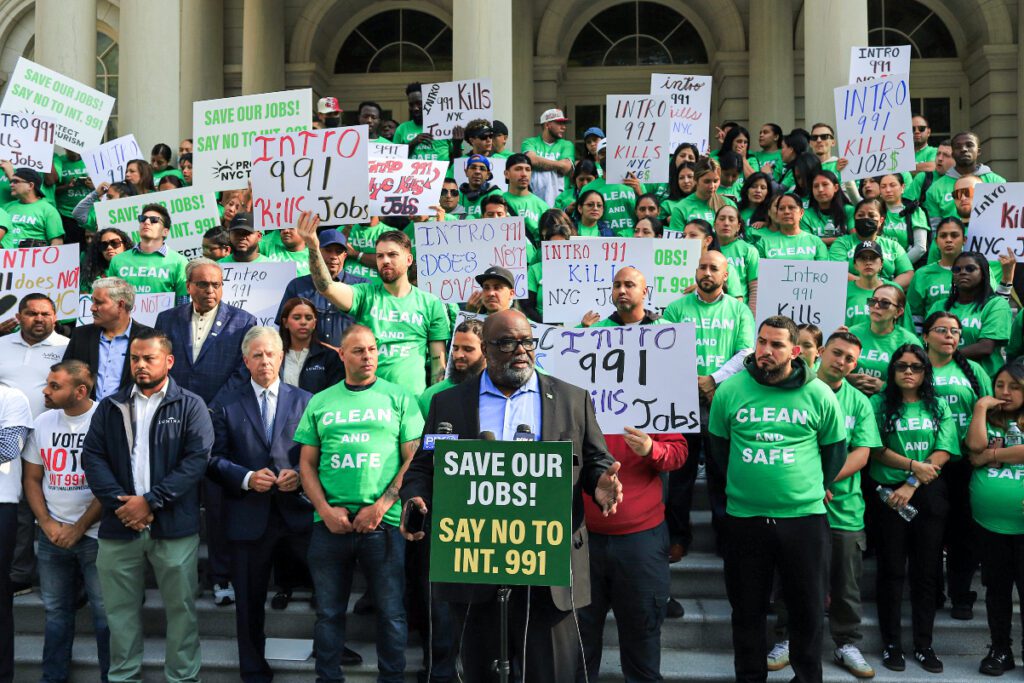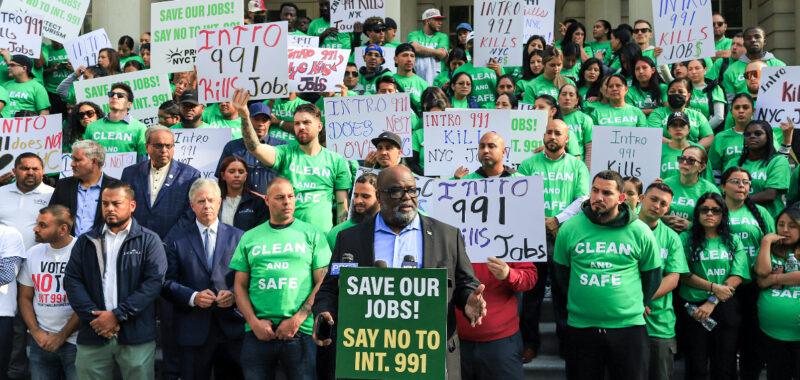
Skift Take
The New York City Council bill has ignited a fierce debate between supporters who claim it will improve safety and working conditions and opponents who argue it could cripple the hotel industry.
Hundreds of hotel sector professionals rallied outside New York City Hall to oppose Intro 991, the so-called “Safe Hotels Act,” which requires hotels to meet stricter regulations.
The act would prohibit hotels from operating without a new “hotel license.” Hotels have to receive various permits to open, but the city doesn’t license hotels like other cities, such as Boston and Chicago.
The bill has gained support from local unions because it includes provisions prohibiting hotels from using subcontractors for core functions such as housekeeping, front desk, and security.
Since being introduced in July, 34 out of 51 City Council members have co-sponsored the bill, a level of support that gives it the potential to pass.
Why It Matters
- The bill could significantly impact hotel operations, potentially affecting room rates and employment practices in the city, whose tourism sector may generate about $5 billion in tax revenue this year.
- The debate highlights tensions between labor unions, hotel owners, and city officials.
- Manhattan City Council Member Julie Menin, who introduced the bill, cited a 2021 homicide at a hotel where she said the city had no jurisdiction to punish the owner as an example of the need for regulation.
By The Numbers
- Roughly 700 hotels in New York City would be affected.
- Supporters of the bill say consumer complaints about hotels have doubled in the past 5 years to the Department of Consumer and Worker Protection (DCWP) and Better Business Bureau.
- The hotel industry says there were “only 315 complaints” against hotels in 2023. If this legislation becomes law, they predict “scores” of hotels will close.
What the Act Would Do
Menin’s office says the bill is subject to revision as council members and constituents provide feedback. But here’s what the latest version is intended to do.
- Create a new license that hotels must get to operate.
- Require hotels to maintain continuous front-desk coverage and have at least one security guard at all times. This may imperil the model of some brands, like Sonder, that don’t have full-time front desk staff at some properties.
- Directly employ most workers rather than use subcontractors.
- Provide panic buttons for workers and maintain the cleanliness of each guest room.
Why Supporters Justify the Bill
- Supporters claim the bill will improve safety for guests and workers. “We do have some bad actor hotels, which is why we’ve had 39 murders at hotels, over 14,500 complaints to the NYPD in recent years,” said Menin.
- They say it will ensure better working conditions. Said Rich Maroko (Hotel Trades Council): “The hotel industry thought they could bully and intimidate our Union and elected officials into backing off this bill. They obviously don’t know us very well.”
- They say it will help combat human trafficking and other crimes.
What Critics Contend
- The act could spike operational costs, potentially driving up room rates. âThe Safe Hotels Act will have devastating effects on our hotels,â said Rahul Patel, treasurer of the Asian American Hotel Owners Association.
- It could unfairly penalize hotels for issues beyond their control, such as a provision requiring hotels to protect guests from excessive noise. “The Safe Hotels Act, if passed in its current form, would do more harm than good, threatening the livelihood of countless hotel owners and workers,” said AAHOA President & CEO Laura Lee Blake.
- It could create uncertainty that deters hotel investments and lending. Kevin Carey, interim president and CEO of the American Hotel and Lodging Association, said the bill’s current version “effectively prohibits hotel management companies from operating in the city” and “could lead to hotel closures and mass layoffs of workers.”
What the Hotel Sector Is Saying
Vijay Dandapani, CEO and president of the Hotel Association of New York City, said the bill would be “highly destructive of the hotel industry.”
- “This isn’t like the hotel licenses issued in cities like Chicago, Washington, D.C., and Boston, which do not give unfettered power to government bureaucrats,” Dandapani said.
- “All key building code requirements are already covered by the certificate of occupancy that New York City requires through a rigorous processs â taking a minimum of two years to first get, in practice,” Dandapani said. “I was co-founder of a hotel company, and I can tell you you have to go through a plethora of inspections of everything from your fire command stations to your elevators to your HVAC systems before you can get a temporary certificate of occupancy.”
Hotels Claimed Airbnb Was Illegal
The hotel sector supported the city’s effort starting in September 2023 to enforce Local Law 18, a host registration law for short-term rentals that capped transient stays and regulated how people could list properties for temporary rental. Is it hypocritical that hotels don’t want the city to license hotels?
- “Someone advancing that as an analogous argument doesn’t know the first thing about hotels,” Dandapani said.
- “Short-term rentals were already violating current law and enforcement was necessary,” Dandapani said. “Hotels are already regulated by commercial laws to make sure construction and design makes them fireproof, while residential units aren’t as stringent. For example, every hotel room has to have a fire sprikler but your bedroom in your apartment doesn’t.”
What’s Next
- The Thursday rally is ahead of a planned Council hearing on the bill. The hearing had been postponed to allow for more feedback and potential revisions.
- The rally aims to pressure the City Council to engage in discussions to shape regulations in a way that balances guest safety with industry viability.

